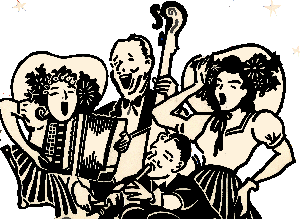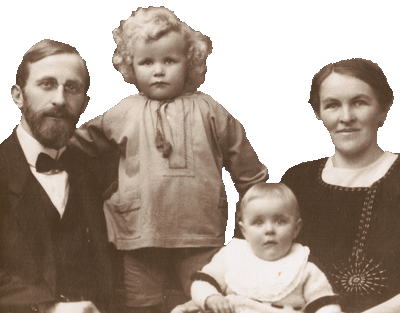
|
Reinhard (Papa), Rheiny, Betty, and
Frieda Frauenfelder in 1923.
|
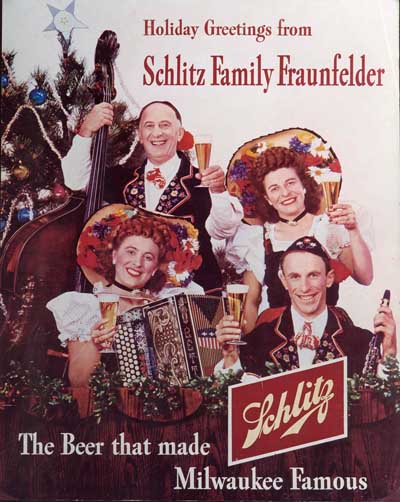
|
Schlitz Family Fraunfelder poster from the
late 1940s, a digital restoration by Boston Harbor
Photography, Olympia.
|
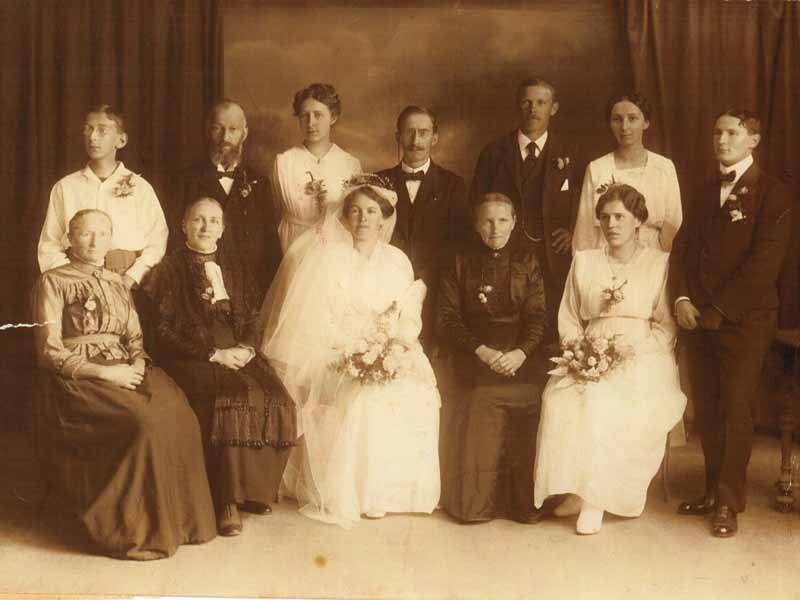
|
Marriage of Reinhard (Papa) and Frieda
Fauenfelder, Switzerland, 1918 (Courtesy Fritz & Yvonne
Fraunfelder)
|
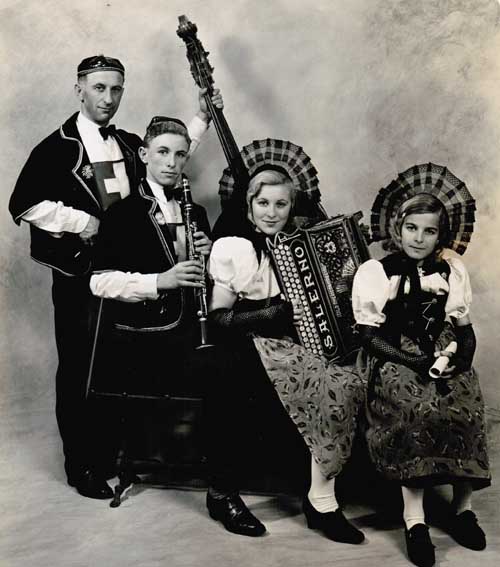 |
Swiss Family
Fraunfelder in 1934 photo taken in Pasadena, CA. The children are listed as ages
15, 17, and 19.
|
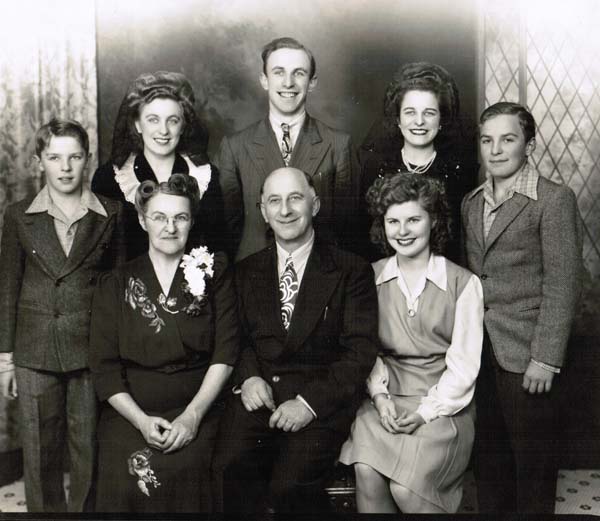 |
Reinhard (Papa) and Frieda Fraunfelder with all six
children. Taken in Madison, Wisconsin in 1946. Seated to
Papa's left is Frieda and to his right is daughter Helen.
Standing from left to right are Fritz, Betty, Reiny, Ruthie
and Hansi.
|
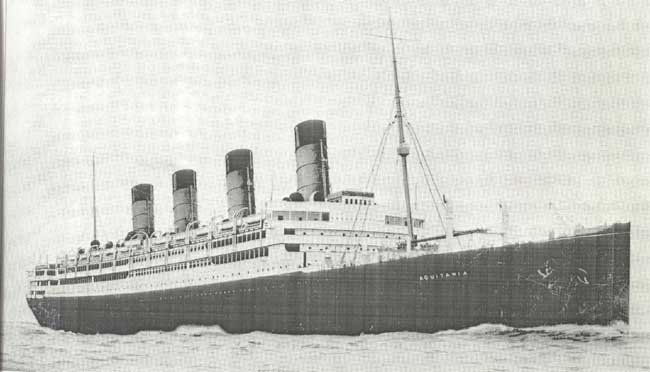
|
The Aquitania, the ship
that brought the Fraunfelders to the United States in 1923.
|
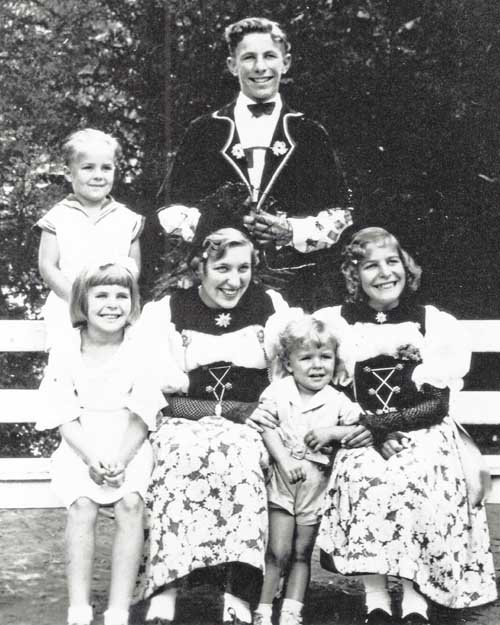 |
The six Fraunfelder children in the 1930s:
John and Rheiny are in the back. Front is
Helen, Betty, Fritz and Ruth. (Photo courtesy of
Sonia Redmond)
|
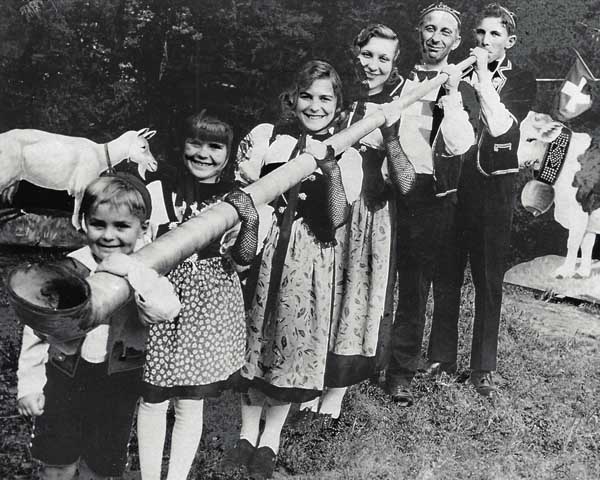
With an alpenhhorn, from left to right is Hansi,
Helen, Ruthie, Betty, Papa and Rheiny
. (1936, Pasadena, CA) |
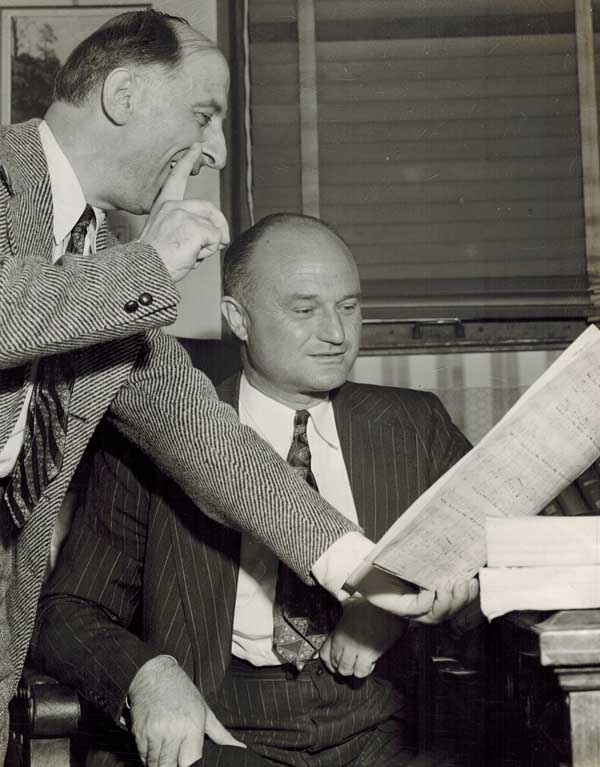 |
Papa unsuccessfully tries to demonstrate to Superior
Court Judge Frank Swain that the yodeling in
Disney's Snow White and The Seven Dwarfs (Silly
Song) is really the Swiss Family Fraunfelder's music.
(Acme News Pictures, Los Angeles, Sept. 5, 1939)
|
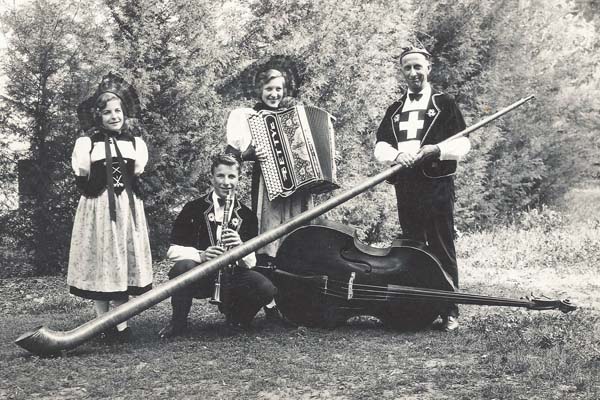 |
The Swiss Family Fraunfelder billed itself as the
"Swiss Echo Yodelers" in the early years.
(Alpenhorn photos courtesy of Sonia Redmond)
|
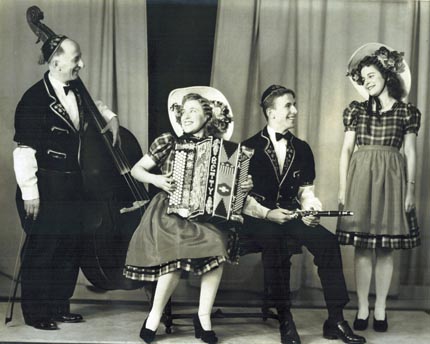 |
Photo taken in Madison, Wisconsin, in 1943.
|
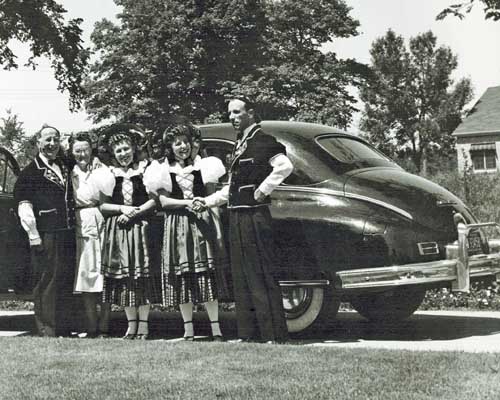 |
The Fraunfelder Car
|
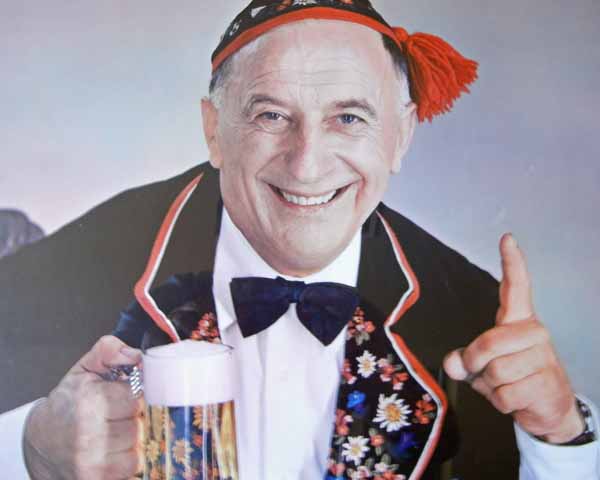 |
Take it from Papa,
Schlitz promotional picture, probably in the late 1940s.
|
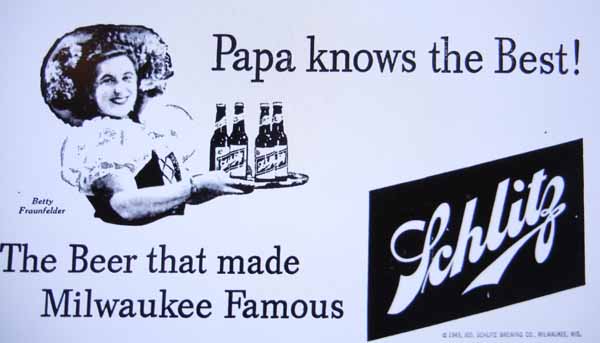
The bottom section of Schlitz Beer Ads featuring Betty
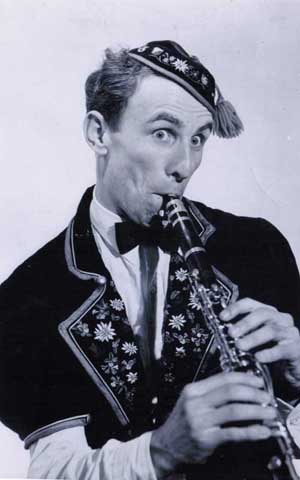
| Adding comic entertainment to
the Fraunfelder act was Rheiny Fraunfelder, one of three
sons of Papa (and three daughters.) Also, Rheiny had a
distinctive low yodel, played the clarinet and sang a
touching tune about a Swiss boy called "Glarner Bueb."
Note in this picture he wears the Swiss "beenie" hat.
The hat tradition reportedly was used by Swiss as
protection when their heads rubbed up against a cow
during milking. The head went against the cow for added
support on a single-legged stool.
Click HERE for
more on Rheiny |
|
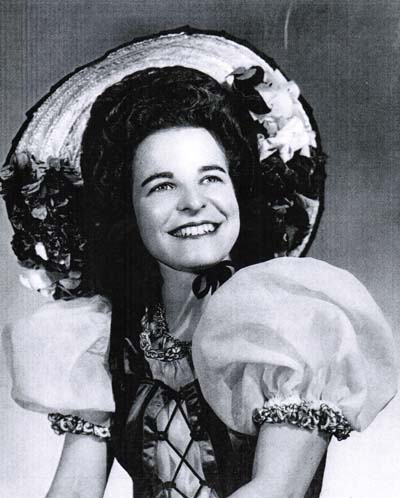
| Ruthie Fraunfelder, 1948 |
|
Ruthie was the alto singer in the group. She yodeled and played piano for the Fraunfelder quartet. |
|
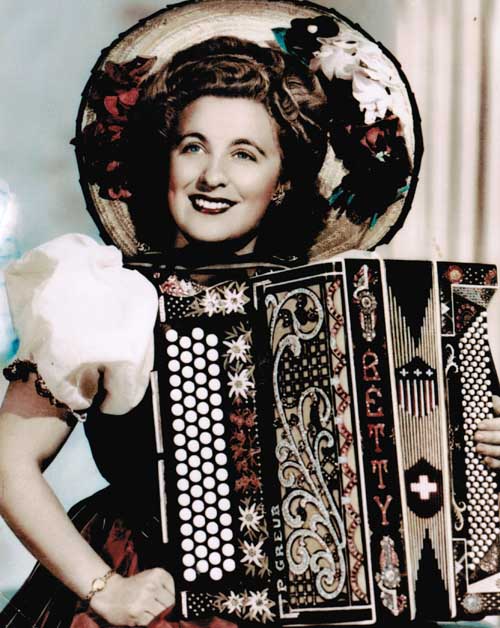
|
Betty sang soprano. She is pictured here with the Greub button
(chromatic) accordian she used through the 1940s
until she purchased a new one in 1964. . |
|
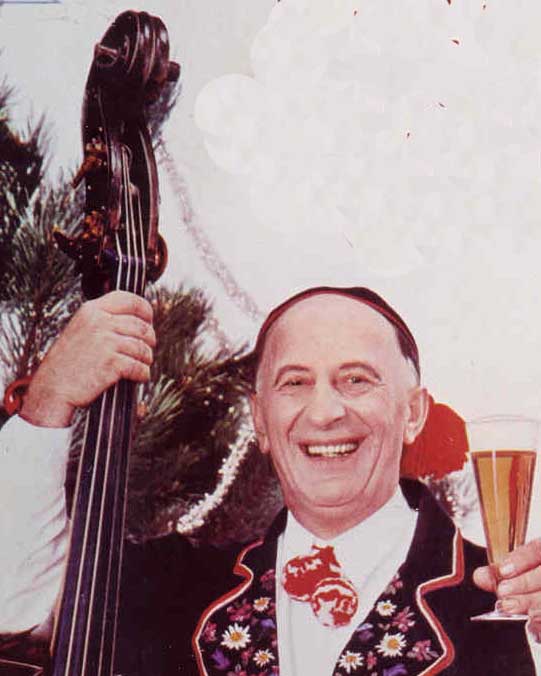
|
Papa, a baritone who taught
music and yodeling to the others, played the
bass fiddle which he called "Grandma." He was
responsible for arranging the music, writing
some of the songs they played, and leading the
group. He is pictured here in a Schlitz beer ad. . |
|
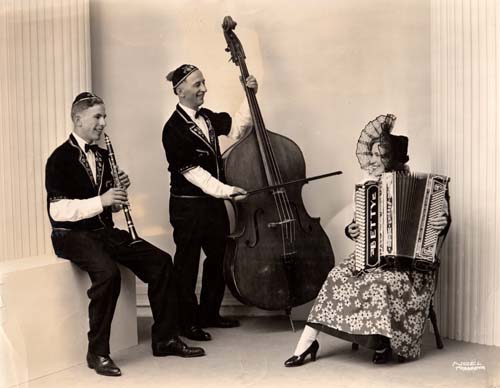
|
| Based on the
costumes and instruments, the picture
was taken about 1939-1940. Curiously,
the professional studio photograph taken
in Pasadena, Calif., included only
Rheiny, Papa and Betty. There is no explanation
for why Ruth, who performed with the
group for another ten years, was not in
the photograph. (Photo by Noel
Photography, Pasadena; courtesy Erika
Williams) |
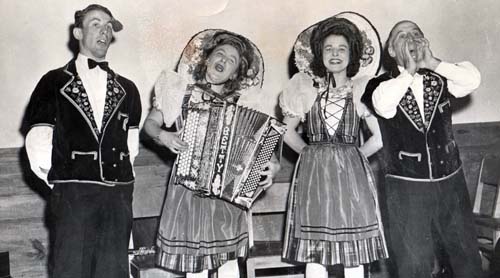
|
Army Signal
Corps Photo. Undated. Circa 1940s
|
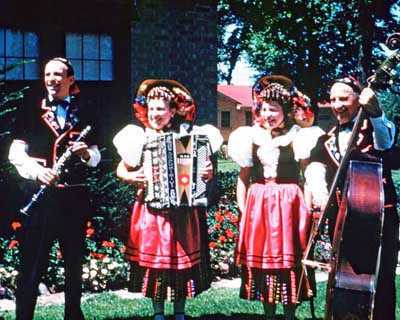
|
| The Fraunfelder
Quartet, Circa 1949; Wisconsin |
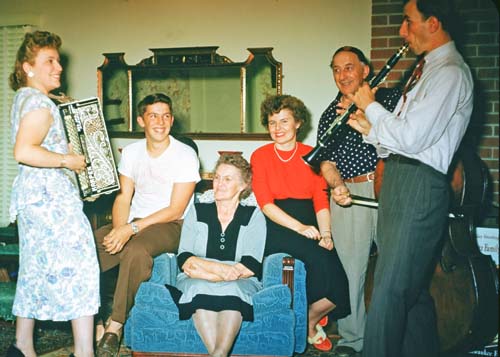
|
| Betty, Fritz,
Mama, Helen, Papa and Rheiny. Circa late
1940s. |
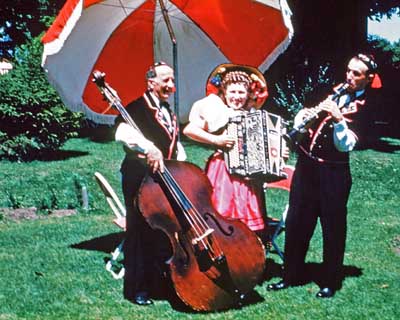
|
| Papa, Betty and
Rheiny. Circa 1950. |
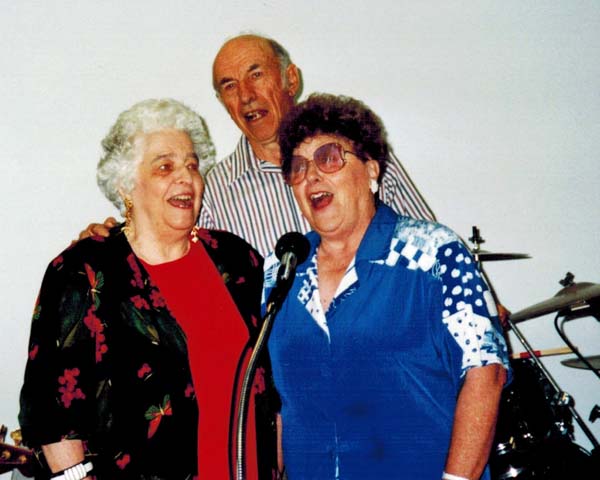
|
| Ruth, Rheiny
and Betty in perhaps their final
performance together for family and
friends later in their lives. |
|
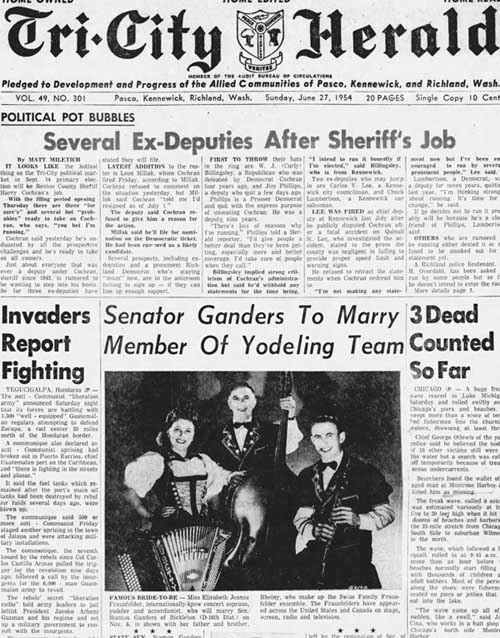 |
Engagement of Betty announced on the
front page of the Tri-City Herald after the couple met in Bingen
the previous year.
Special thanks to Rich Edwards, Tenino City Historian.
>See Full Story |
|
The Fraunfelder story
They were the “Swiss Family Fraunfelder,” a unique
family ethnic yodeling and singing group
led by the father and music composer, Reinhard "Papa"
Fraunfelder, a bass vocalist on the bass fiddle;
daughter Betty Fraunfelder (Ganders,) a soprano on the
chromatic accordian; son Rheiny Fraunfelder, a comic tenor
on the clarinet; and daughter Ruth Fraunfelder (Buckley,) an
alto
singer on the piano.
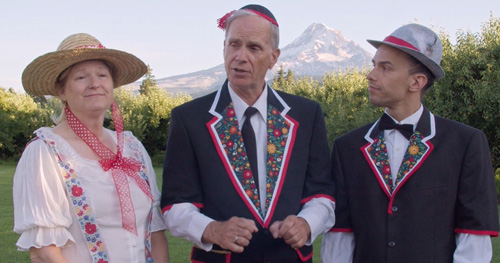 |
The Fraunfelder story was
included in a docu-drama style video of musical
groups produced September 2022
by the History Museum of Hood River County (Oregon) as part
of its "Cemetery Tales" series. It is performed
by local actors. The video was produced and directed by Joe Garoutte, a Hood
River cinematographer and written by E.
Michael Friend, a former newspaper editor who
produces industrial and feature films. It premiered
in Bingen, WA, where 70 years earlier Betty
Fraunfelder met her husband. The video won a 2023
Silver "Telly Award" in non-broadcast general
history for its production excellence.
>Click for YouTube Video |
 |
| "Mama Fraunfelder" at party
celebrating her 100th birthday. Nov. 15, 2010. From
a video shot by her grandson, Buba Fraunfelder. |
Their career spanned about three decades:
entertaining American soldiers, promoting
Schlitz Beer, advertising dairy products, flirting with
Disney and the motion picture studios, performing
live radio shows, singing for the "Chatauqua
Circuit," yodeling at state fairs, cutting records,
appearing at Rotary and other civic clubs, and much more.
They billed themselves as "The Only Four Part Yodelers in America" that
sang "Melodies from Switzerland."
If they didn't achieve the fame their
paternal leader sought and promoted, their touring Packard car and teardrop trailer cruised down many of the same roads of the famous in music and movies in the 1930s, 40s, and 50s.
At left, they are pictured in a Schlitz Beer poster
in what may have been the peak of their musical
careers, December of 1949.
Frauenfelders in the 1600s
The ancestors of these yodeling Swiss German family musicians directly date back at least to the early 1600s, to Hans Konrad Frauenfelder, who lived in the very small village of Adlikon in the canton of Zurich (historic population since the |
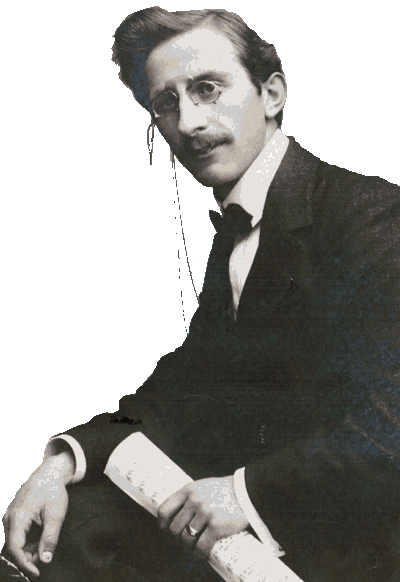
Papa Fraunfelder,
1922
At the time, the name was spelled
"Frauenfelder" |
|
17th Century is around
250-500). His son, by the same name was born in
1663.
Reinhard and Frieda
Nine generations later, Reinhard
"Papa" Frauenfelder was born in Wildegg,
Switzerland, in the canton of Aargau.
Papa's father,
also named Reinhard, and grandfather, Konrad Frauenfelder, were both
ministers. It is
believed that his father was married to Katherine (Neemeier) Frauenfelder, although
that record has not yet been confirmed. (His parents
are pictured at right.)
His grandfather was married to Anna Glauser.
The most famous citizen of the Swiss region
where the Frauenfelders resided was U.S. actor Yul Brynner (1920-1985.)
Papa was engaged to a local girl from wealthy
family. Her parents were Samuel Fehlmann and the
former Elisabeth Seeberger. But when his fiance'
died of tuburculosis during the engagement, he
proposed to and married her older sister, Frieda, on
June 14, 1918. Frieda would later be known to
many as "Mama Fraunfelder."
"Papa" and "Mama" would be
married for more than 70 years. They started their family
in the Swiss village of |
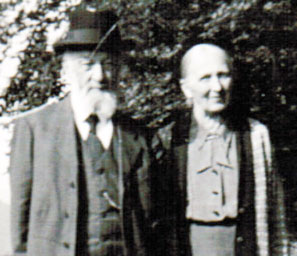
Papa's Swiss Parents
|
Amden, south of Adlikon in the
canton of St. Gallen.
1923 - Leaving Switzerland for the USA
Reinhard (Papa) seemed to have behavior that the Germans and later Americans called "wunderlust." Five years into his marriage and 28 years old, he took his 34-year old wife,
Frieda or "Mama" Fraunfelder, and two young
children, Rheiny, 3 years old, (born Feb. 28, 1920) and Betty, 1 1/2 years old,
( born Dec. 22, 1921) from a home near the
region where their ancestors had lived for
generations.
Leaving from Basel, Switzerland, they departed to the port city of Cherbourg, France. From there, they boarded the Aquitania
ship July 14 and arrived in the United
States on July 23. While this was the biggest trip,
the family would move many, many times in the
future. First, they moved near acquaintances in Van
Nuys, Calif. They would never return to the Alps.
By the family's own calculations, they would live in 27 locations in the United States. |
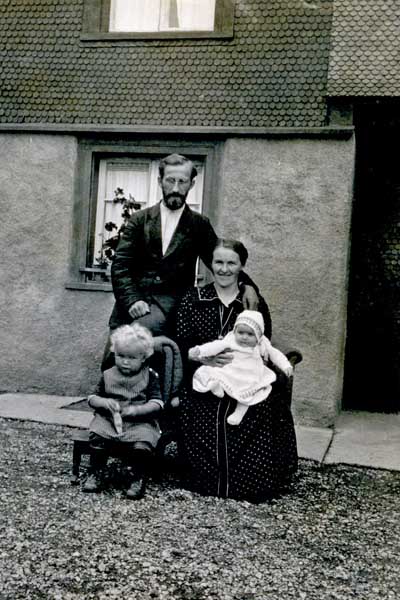
Papa, Mama, Rheiny &
Betty, 1922
Switzerland |
Show Business in California
Papa, a choir director and organist, was fixed
on an entertainment career and he took his family
directly from New York to Southern California - perhaps meeting up
with Swiss show business friends that had preceded them.
Some of those Southern California years were very difficult
and Betty Frauenfelder would later recall that the children in the family, which eventually totaled six, often
went without shoes and other essentials.
The fourth member of the musical group, Ruth or "Ruthie", was born March
25,1924 in Van Nuys, California where the family
lived from July 1923 to April 1926. The family moved
to Atwood, Calif. Three other
children were born but were not part of the
performance group that ultimately evolved. Helen was
born Sept. 12, 1928 in Anaheim, where they lived
from June 1928 to May 1931. When she was very
young, she was pictured in Swiss costume with Papa,
Rheiny and Betty -- indicating that Helen may have
initially been a young performer. The fifth child,
John or "Hansi,"was born Aug. 22, 1930 in San Fernando. |
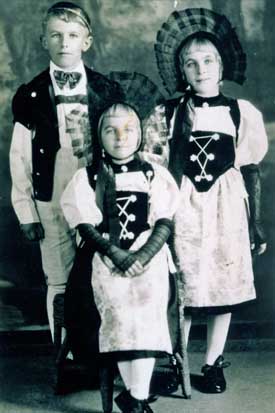
Rheiny, Ruthie & Betty
Circa 1930 |
At about the time of Hansi's birth, Reinhard and
Frieda operated a chicken ranch called "Poorman's
Poultry Products Company" on Orangewood Road near
Anaheim. The exact location is not known but
Orangewood Road is just blocks away from Katella
Avenue and Disneyland. Reinhard would later say he
left that business after thieves stole all his
chickens.
The sixth child, Frederick or "Fritz " or
"Fritzi" was born Aug. 16, 1934 in Pasadena.
The family lived at 456 W. Walnut St. in
Pasadena, near North Orange Grove Blvd, and
near what today is the Pasadena Museum of
History. It is very close to the route
of the Rose Bowl Parade. The home does not
appear to be in existance today.
Today Fritz is a prominent opthalmologist best known for his work with cancer of the eye. The author of many publications and books, he is the founder of the Casey Eye Institute at Oregon Health and Science University in Portland.
Papa Fraunfelder and "The Swiss Echo
Yodelers"
|
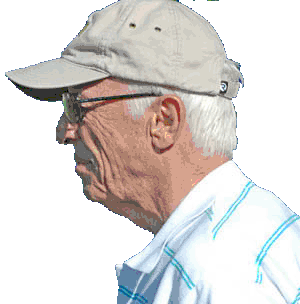
Fritz Fraunfelder
Fraunfelder Family Reunion
Wiffleball Coach, 2010 |
Early in the 1930s, the family act performed under
the name, "Swiss Echo Yodelers."
Sometime between
1934 and 1938, the Frauenfelders' decided to drop the
"e" and |
"Americanized" their
names to Fraunfelder. There were other name changes.
Rheinhard changed his name to Reynard,
Raynard, William, or Raymond but was best
known both on and off stage as "Papa Fraunfelder."
By 1935, the group consistently started referring
to itself as the "Swiss Family Fraunfelder."
Snow White and Dopey's
Fraunfelder voice
Their promotional material included credit for Walt
Disney's 1937 blockbuster, "Snow White and the Seven
Dwarfs." Videohound has the family listed among
untitled movie sound credits. And a 2001 "Platinum"
DVD of the Disney movie includes a special feature
of a rough unidentified recording that sounds very much like their yodeling voices.
That recording may have been the basis for music that was mixed to
become "Silly Song" (The Dwarf's Yodel Song) in the movie.
|
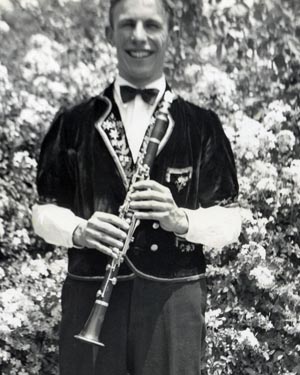
Rheiny
|
The Fraunfelders claimed
Young Rheiny was the yodeling voice of "Dopey," a dwarf character that otherwise
did not speak. Confirmation of the Fraunfelder's
involvement was contained in a 1976 interview with
longtime Disney sound man, Jim McDonald: "In the
early days, way back onto Snow White, they had the
Fraunfelder family, a Swiss family, and they did a
lot of the yodeling for the dwarfs.
"I played in the band; I played jugs and ocarina and different things,"
said McDonald.
McDonald said the yodeling was a request of Walt
Disney himself. |
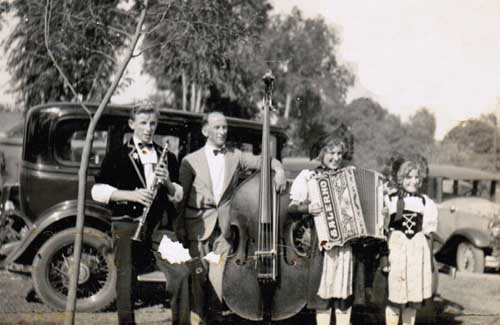
Pasadena, 1936
|
But as the movie
production stretched on, McDonald said the Fraunfelder
sound was reworked and McDonald himself filled in with
some of the yodeling. Yodel researcher Bart Plantenga
writes about the Fraunfelder/Dopey connection in his
2012 book, "Yodel in Hi Fi." Plantenga said Pinto
Colvig, the voice of Sleepy and Grumpy, is also
sometimes given credit for Dopey's yodeling voice.
"Other sources mention Wesley Tuttle or Zeke Clements,"
Plantenga said.
The Covina Argus in California reported Nov. 22, 1935 that
13-year-old Betty Fraunfelder had a contract with "Mickey
Mouse Productions" to provide sound effects for animation.
That has not been verified through other sources. The
Fraunfelders may have sometimes performed the Dwarf's
Yodel Song as part of their stage or radio act. It
is on a typed list of
59 Fraunfelder performance
yodel tunes found in the family archives.
MGM, Universal and a
confrontation with Disney
|
Part of the confusion or reluctance to
attribute Snow White credits to the Fraunfelders may
be due to a later court confrontation between Disney
and the family.
Papa used the experience to promote the group for many years in the future and described himself as the "yodeling coach" for
Snow White.
However, on Oct. 15, 1938, United Press reported that the Fraunfelders brought a $50,000 suit against Disney for using their melodies without permission in Snow White.
United Press reported that Papa yodeled for Superior
Court Judge Frank G. Swain at trial on Sept. 5, 1939
in Los Angeles. Acme News Pictures, owned by Scripps
Newspapers, moved a national wire photo of Papa and
the judge. Newspapers later reported that the judge dismissed the
$50,000 suit, saying he could not "tell one yodel from another."
Swain worked with a number of entertainers during
his career on the bench, approving Leonard Nimoy's
10-picture contract in 1952.
The Daily News of Huntington, PA, reported in early 1940 that Papa also sued Universal Productions over use of his yodeling in the motion picture "Mad About Music" (starring Deanna Durbin) without compensation.
|
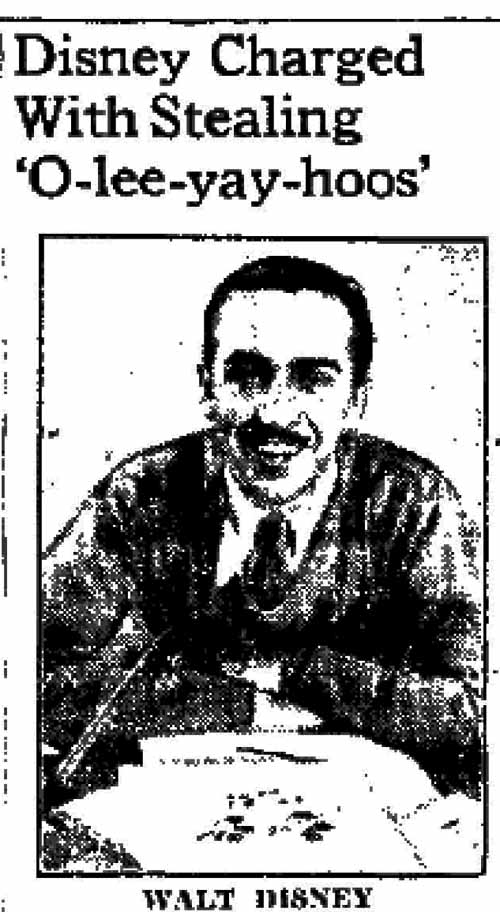
Wisconsin State
Journal
1938 |
The Internet Movie Data base does list the Fraunfelders as uncredited yodelers in two 1938 Metro Goldwin Mayer pictures, "Paradise for Three" and "The Great Waltz." IMDb lists both Betty Fraunfelder (about 16 years old) and Ruth Fraunfelder (14 years old) as uncredited yodelers for The Great Waltz.
However, some recent prints of the movie do not seem to contain any
yodeling. Papa and Rheiny were uncredited yodelers in Paradise for Three, a romantic comedy with Robert Young set in the Alps, according to Turner Classic Movies data base. The family's flyers also claimed music contributions in "Melodies in Spring."
The Chautauqua Circuit
By 1939, the Fraunfelders were on the last years of the "Chautauqua Circuit," performing for
community gatherings across the country where people would also listen to political speakers |
like Franklin Roosevelt, evangelists, and diverse musical bookings like the American Opera Company and country fiddlers.
Grace Moore, a Broadway and film singer with an operatic voice, and Eleanor Roosevelt shared the same circuit with the
Fraunfelders during this era. The Fraunfelders may have performed on the
circuit through at least 1942. They were
listed in 1940-41 as part of the Chautauqua talent
program for the "Brown Lyceum Bureau" of St. Louis,
Missouri.
Click HERE for more
information and Library of Congress Fraunfelder posters from
the Chautauqua Circuit.
|
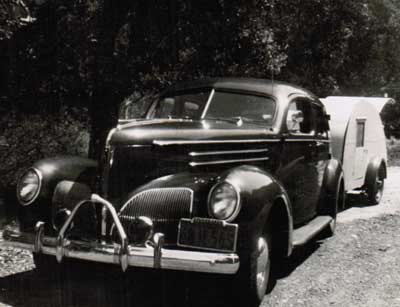
Fraunfelder Packard,
1938 |
Also in
1939 and in early 1940, the Fraunfelders made multiple
appearances at concerts and dances sponsored by Swiss
organizations along the coast of the Western United
States including San Diego, San Francisco, Tacoma and Seattle, Wash.,
and
Portland, Ore. The San Diego County Swiss Club was a stop for the Fraunfelders on Dec.
8, 1939. At that point, the group performed a number of waltz and folk
tunes from Switzerland followed by a skit and "sound" films that Papa used
to promote the Swiss-based Red Cross. These may have been components of
the program they used on the Chautauqua Circuit. They
played in some halls that are still standing and quite
historically significant. California Hall in San
Francisco hosted some of the first gay rights events of
the 1960s and is the home of the California Culinary
Academy. Swiss Hall in Tacoma is now a pub and
restaurant on the campus of University of
Washington-Tacoma. They entertained at the
historic Masonic Lodge that became Seattle's Egyptian
Theater. San Diego's Germania Hall, no longer standing,
was the location of many labor and ethnic group
meetings. Click HERE
for more information on the Fraunfelder tour of Swiss
clubs where they also performed with local Swiss vocal
groups.
|
The family spent the 1940s on concert tours throughout the U.S. and
Canada and participated in USO tours for World War II troops and
had hundreds of performances at Veterans Hospitals.
They also often performed at service clubs, schools,
and small concert halls. Their program during this
era sometimes included slides and movies of
Switzerland, and even feature-length motion
pictures.
The family appeared on stage with stars of the day such as Tom Mix, Edgar Bergen and Charlie McCarthy, Eddie Cantor, Rudy Vallee, Caesar Romero, Edward Everett Horton, and the Horace Heidt Orchestra. |
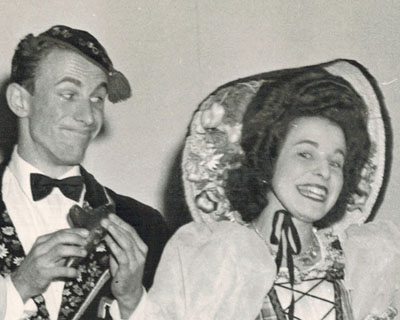
Rheiny and Ruthie
|
California Legislature
The family often referenced a resolution
praising their performances that was passed
by the
California Legislature on June 9,
1939.
Click HERE
for a copy.
Perhaps more
noteworthy than the resolution itself was the special reception where it
was presented to the family.
The presenter was newspaper cartoonist
and actor Leo Carrillo (perhaps best known for his role as "Pancho" in
the 1950-56 syndicated television series, "The Cisco Kid." )
|
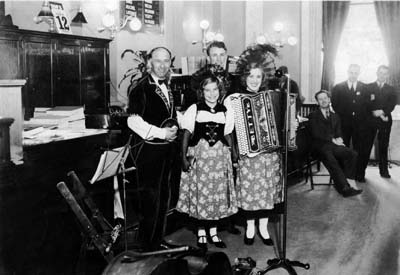
While this is an unidentified photo, a roll call
tally board in the upper center indicates this was a
picture taken at the California State Assembly
between 1936 and 1940. Perhaps this was before or
after the resolution was presented.
The calendar says it is March 12 but the year can
not be deciphered. |
Wisconsin and Schlitz Beer
But perhaps the greatest fame for the family came when they were under contract with Schlitz Brewing company for more than 600 events including television, radio, and personal appearances. For this, the group was temporarily renamed, "The Schlitz Family Fraunfelder."
Papa Fraunfelder told the Milwaukee Journal that the
family had performed for 200 Wisconsin schools in
the spring semester of 1941. They resided in
different locations in Wisconsin, living in Elm
Grove, Madison, Whitewater, Elkhorn and Milwaukee.
From Wisconsin, they traveled throughout the
Midwest, South and East. But they performed
primarily in Wisconsin and Illinois
They gained enough fame by 1941 that an emergency
appendectomy surgery for 19-year-old Betty
Fraunfelder made the news in the Nov. 18 edition of
the State Journal newspaper in Madison. The paper
reported that the emergency surgery forced the Swiss
Family Fraunfelders |
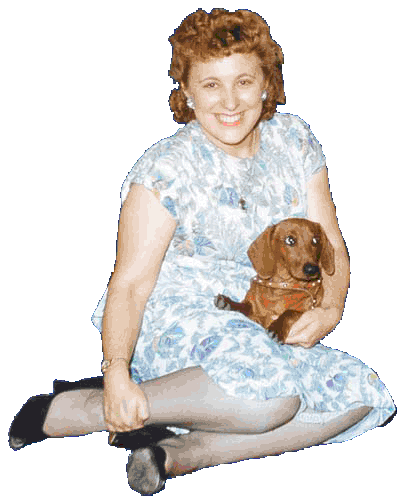
Betty and her dachshund, "Teddy"
|
to cancel
appearances in Boston, Philadelphia, New York, "and other
Eastern cities."
These were the years of World War II and people were fearing
for the future of Switzerland against Nazi Germany. "We've
had dictators before in Europe and the Swiss sent them all
home with bloody head," Papa told the Journal reporter. . In
his memoirs, Donald E. Van Scotter, wrote about his Elkhorn
neighbors, The Swiss Family Fraunfelder. He wrote that they
lived in a a house
so large that the previous owner, a
congressman, had servants. The Fraunfelders were "a
talented musical family and they had a large grand
piano in their living room," he said.
They did a steady business of performing at fairs and company picnics in the
Wisconsin dairy region with many Swiss immigrants.
A Milwaukee Journal article announced Papa
Fraunfelder was appearing on a regular WTMJ radio
program three times each week beginning July 18,
1949. It was sponsored by Schlitz.
Schlitz bought display advertising with photos of
the family and the advertising slogan was "Take it
From Papa, Papa Knows Best...The Beer That Made
Milwaukee Famous." The ads featured "Papa" raising
his finger but often also pictured |
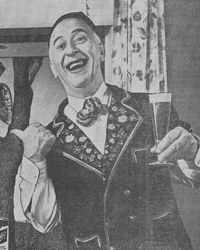
Papa Schlitz
|
Betty, Ruthie and Rheiny.
Rondo Records - 1947 to 1950
Robert L.Campbell, a Clemson
University professor and part-time music historian, reports
that the Fraunfelders cut at least three two-sided 78-rpm
records at Rondo Records in the fall of 1947 and sold
records through at least 1950 on that label. One of the
songs was a traditional Swiss
|
song done entirely in Swiss-German
or "Schwyzerdutsch." (The Herd Song,
Rondo 569A, Click
HERE for the Herd Song.) The
flip side was Garibaldi Schottisch. The second
record, Rondo 570, included "The Milkmaid" and
"Yodel Polka." The third record featured the
group yodeling a waltz about a Cuckoo bird, a song that included
imitation cuckoo calls from a wooden flute. It was also sung in Swiss-German (Click HERE
for Cuckoo Song, Rondo 571A) On the flip side was
the "Yodel Laendler," a traditional Swiss
polka. A slow-paced version of the tune, it
nevertheless included Betty's |
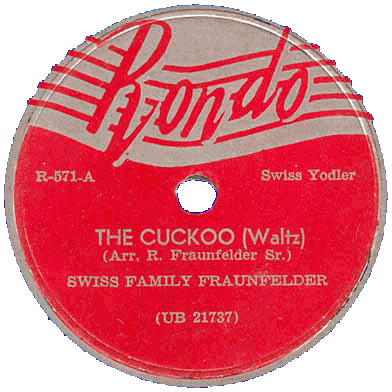 |
signature piercing shriek of joy, Yeh Hee! (Click
HERE
for Yodel Laendler, Rondo 571B.)
Rondo 569 and 571 records listed Papa
Fraunfelder for the arrangement. The Fraunfelder records
were released in conjunction with some Rudy Plocar polkas.
Campbell said his research indicated
Papa Fraunfelder had a heart
attack in 1947 which caused cancellation of some
Fraunfelder performances. Some Rondo Records may
still be circulating as a German dealer sold a RondoFraunfelder record for
$19.95 on Ebay in April, 2011. Rondo Records has changed ownership many
times and today its assets are part of the former
Pickwick Records and Polygram Records.
The quartet becomes an Oregon trio
While the Fraunfelders will never be remembered for pop hits, they did take a stab at many popular songs in their day with ties to the old country.
These tunes often featured Betty's soprano voice: Cheri Beri Bin (Ciribiribin),
an Italian ballad made popular by Grace Moore in the
early 1940s; Toolie Oolie Doolie, a Swiss tune sang by the Andrews Sisters
that made Billboard's top three in 1948, Wooden Heart (Muss I Denn,
German family favorite Taken to No. 1 in America by Elvis Presley
in 1961), and the 1965 Sound of Music’s Edelweiss. Betty’s singing of Ciribiribin |
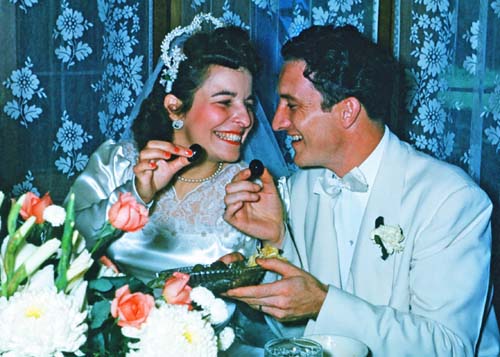
Ruthie marries, 1950 |
reportedly won rousing applause at a Madison, Wisconsin, Rotary meeting attended by 400 people in January, 1941.
After finishing up a
three-times-per-week radio program on WTMJ in
Milwaukee, the Fraunfelders moved to the San
Francisco area in 1950. Alpine Record Co., of San
Mateo, Calif., pressed Swiss Family Fraunfelder
recordings, and periodically there were small articles
about the group in Billboard Magazine's "International"
section. Alpine may have been the Fraunfelder's own
label. Some Alpine records were later produced in Portland,
Ore., after the family was living in Oregon.
Papa stubbornly discouraged
his performing children from marrying - it would likely break up the act.
Ruth Fraunfelder broke the ice. She married Dick
Buckley Sept. 2, 1950 in Elm Grove, Wisconsin. Dick
was a plant superintendent for Sprague Electric and
Cera-Mite in Grafton, Wisconsin and met Ruth around
a Fraunfelder performance. Ruth's maid of honor was sister Helen Fraunfelder. Brother John Fraunfelder was an usher.
Ruth and Dick remained to raise a family in Menomonee Falls,
Wisc. Ruth died in 1997 and Dick died in 2016. Click
for
Dick Buckley obituary.
In 1950, the rest of the family moved
again....this time in Oregon's Hood River Valley in
what was called the "Tucker Hill district." Papa and
Rheiny operated a fruit orchard that they called the
"Mel-O-Dee Ranch." Papa told at least one audience
that he would dedicate a musical composition to Mt
Hood which he said had areas that resonated well for
yodeling. |
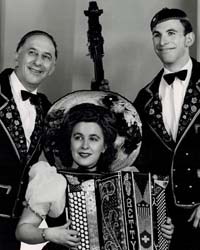
The Trio - Janesville, Wisc.
|
One Hood River ranch owned by the Fraunfelders operates today as the Pheasant Valley Winery and vineyard.
The loss of Ruth made an impact on their music. A subsequent release of
the Cuckoo Song featured only Betty as a soloist in the opening. Click
HERE
for the later Cuckoo version.
A note in the international section of Billboard Magazine in 1953
announced the release of "Ski Yodel Waltz" but noted the market was
"pretty limited for this sort of thing." Click
HERE
for Waltz.
The 1950s Milk Run
The Wisconsin Journal reported in May, 1948 that Helen
Fraunfelder, the younger sister of Betty and Ruth, was among 16
finalsits for "Alice in Dairyland," the queen that
reigned over the Wisconsin Centennial Exposition and
apparently promoted milk products. The pageant included an
evening gown competition and speaking voice test, according
to the report. It is one more example of strong Fraunfelder
ties to the dairy industry.
The ad at right promoted
a free Wisconsin picnic for dairy farmers sponsored
by the Pure Milk Products Cooperative that
functioned in the Midwest including Chicago.
A few years later, the Fraunfelders made two songs in Portland that apparently
were
advertising jingles for "Rocky Mountain" brand milk, a product of
the Cache Valley Dairy Association in Utah, founded in 1941 by a
Swiss emigrant, Edwin Gossner. At the time, the association
was the world's largest supplier of Swiss cheese and is
owned by Borden today. Since 1966, the Gossner family operates Gossner Foods in Idaho, California and Utah and specializes in Swiss cheese and
milk. The current chief excecutive officer at Gossner,
Dolores Wheeler, is the daughter of Ed Gossner and
particularly recalled performances by Betty Fraunfelder,
according to Jason Simpler, a spokesman for the company. The 1950s title song,
"Rocky Mountain Milk" featured vocals by Betty. There was
also an instrumental version on the flip side.
Click HERE for Rocky
Mountain Milk jingle. Perhaps related, newspaper accounts
talked about the Fraunfelders appearing in Idaho Falls,
Idaho, for the Wallaco Dairy Co. on Nov. 4, 1953.
A short Billboard Magazine review later in the year told of the
re-release of "Song of the Milk Maids," which the author said could be an
eye-opener for early morning DJs. (Click
HERE to hear tune.) The song had
also been issued earlier on Rondo records. Some
records were released later under the |
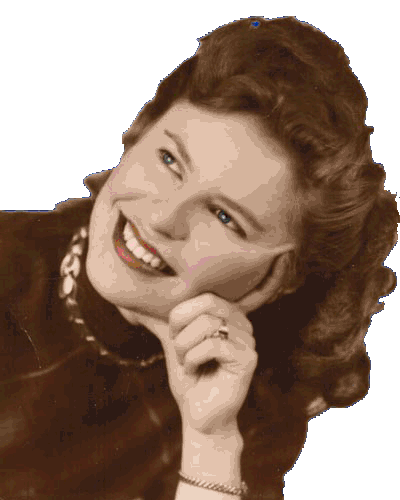
Helen
Fraunfelder, 1954
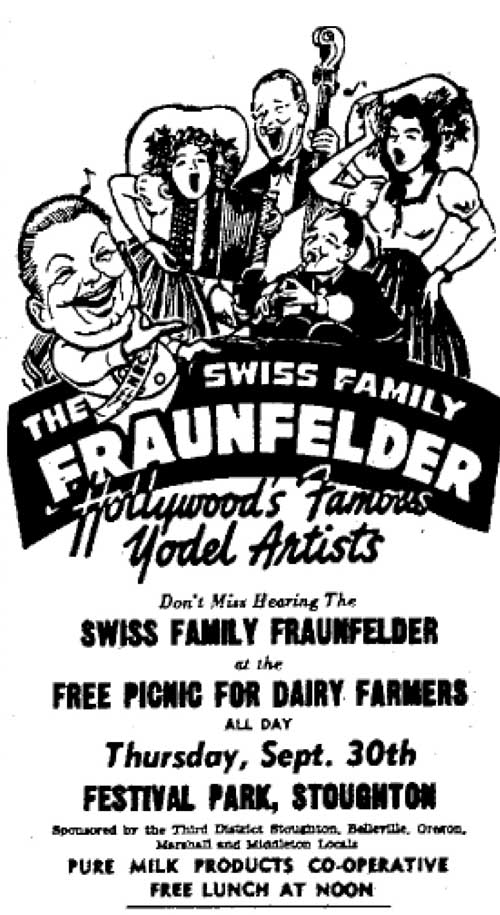 |
"Yodel Melody Record Co" label, Hood River, Ore. Ruth, now married, was not on these records. or in their performances.
The remaining trio made appearances through the mid-1950s,
primarily in the Pacific Northwest. For instance, they performed at the Southeast
Washington Fair in Walla Walla in 1952 according to the
local newspaper, The Walla Walla Union Bulletin.
Betty's engagement to a
San Francisco man, Ernest Waespi, was announced in
The Oregonian newspaper (Portland) in February,
1953.
That may have been the last of many failed
engagements. She married a state senator from
Bickleton, Wash., Stanton Ganders, in November,
1954. Betty and Stanton met at a Shrine Convention
in Bingen, Wash., on May 8, 1953. They had three children: Larry, Linda
and Lisa. |
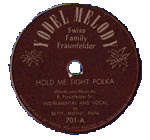 |
Rheiny married on April 16,1955
(although there were incorrect family reports of a
1954 wedding.) He married Annelise Muecke of
Portland, Ore., a graduate of Marylhurst College.
Annelise was a granddaughter of one of the early
German families in the "Old Aurora Colony." The
colony included 600 Swiss and Germans who engaged in
communal living from 1856 to 1883 in Aurora, Ore.
Rheiny and Annelise or "Annie" lived in Salem, Ore.
and had three children: Ryan (Buba), Erika, and
Heidi (Finki). Their wedding photo is pictured
right.
The Goldendale Sentinel, a weekly newspaper serving
the Bickleton area where Betty and Stanton lived, reported
in May, 1958 that the Fraunfelder trio was still doing
periodic performances in the Pacific Northwest. Betty
also likely made some solo appearances supporting her
husband's political campaigns for the state Senate and two
unsuccessful bids for Congress.
|
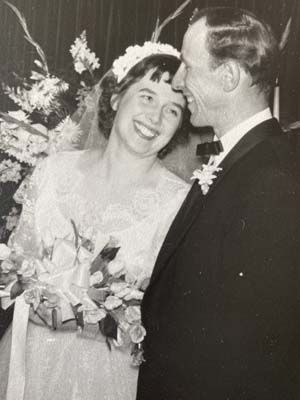 |
Heidi M. Fraunfelder (Right)
Heidi passed away at Salem Health Hospital from a long fought illness on November 13, 2024.
Born in Hood River Oregon May 9, 1959 her family moved to Salem in 1961 where Heidi grew up and graduated from McNary High School in 1977.
She remained in Salem until her recent passing. She is survived by her sister Erika Williams and brother Ryan Fraunfelder.
Any donations in memory of Heidi, please forward to the Oregon Humane Society.
|
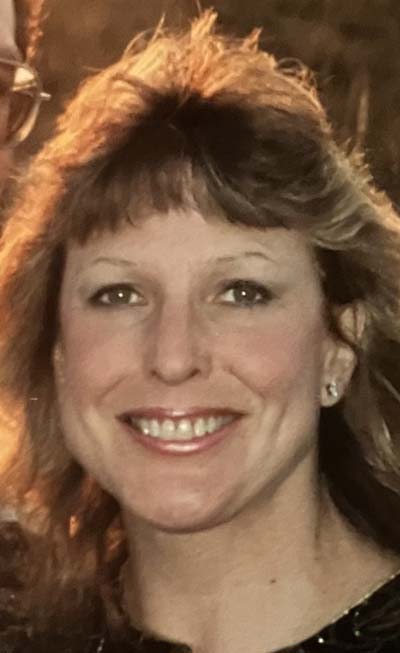 |
The 1960s
Betty, who moved to Spokane with
her husband and three children in about 1960, continued
making solo appearances, performing for local television
shows such as those hosted by cowboy singer Cliff Carl,
charitable groups, public schools, nursing homes, county
fairs, and
developmentally disabled residents at state institutions at
Medical Lake and Lakeland Village. Favorite requests
included
Toolie Oolie Doolie, Edelweiss from the
1965 motion picture,
The Sound
of Music, and Muss I Denn (Wooden Heart)
that Elvis Presley
made popular overseas and in the 1961 movie GI Blues.
Her solo of "How Great Thou Art"
and "May The Good Lord Bless and Keep You" were popular
requests at church services.
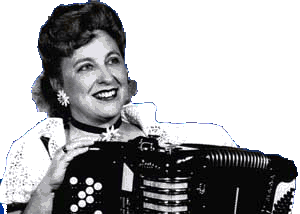 |

Link includes 1960s photos and accordian history
|
Papa and Handwriting
Papa and Frieda lived in Portland during the 1960s, where Papa turned his
hobby of handwriting analysis into a bit of a
business and made music, including playing his foot
pump pipe organ, his hobby. He taught that
"handwriting was brainwriting" and changing handwriting could
actually change characteristics of a person. Not
in dispute was the fact that Papa had very
impressive handwriting. Police consulted him on
some
crime case investigations involving handwriting.
Check out family
handwriting samples
here and original music compostion at
the bottom of the
music download page.
On occasion, music
again came from Papa's home on Portland's Canyon Crest Drive as friends and family brought their instruments and gathered around his organ to sing and yodel. More often, small groups would gather for handwriting classes taught by Papa from a lectern in his living room. |
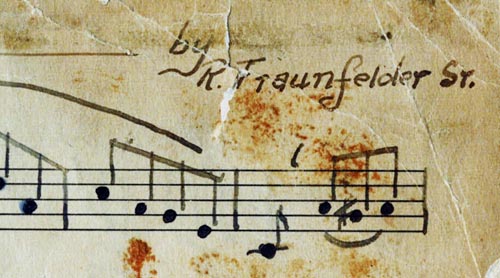 |
Papa and Frieda Fraunfelder moved to Spokane's
Sans Souci subdivision in 1975 where they lived in a
single-wide mobile home near the former Natatorium Park.
A mid-1970s Spokane Spokesman-Review story quoted 80-year-old
Papa,as still complaining that Walt Disney "was a
hard man to yodel for." Disney wanted happy
yodeling."
Well, it took quite a while, I couldn't just take it out of my shirt sleeves," he said.
Portions of the story were picked up by Associated
Press on Jan. 6, 1976.
Click HERE for the Spokesman-Review story
.
In 1983, the San Francisco-based "Swiss Journal"
published a page three story marking the 65th
wedding anniversary of Papa and Frieda.
Click HERE for
Swiss Journal story.
Papa and Frieda moved to Woodburn, Ore., and later Keizer, Ore. in 1985.
Papa died in August, 1988, at the
age of 93. A local newspaper wrote about Frieda's 100th birthday
in 1989. Frieda died in 1990, three months before her 101st
birthday.
|
|

